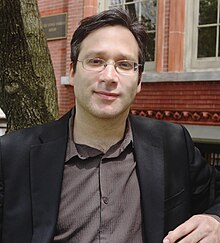Gary Marcus
| Gary Marcus | |
|---|---|
 |
|
| Born |
February 8, 1970 Baltimore, MD |
| Residence | New York City |
| Nationality | American |
| Occupation | cognitive scientist, author |
| Website | garymarcus.com |
Gary F. Marcus (born February 8, 1970) is a research psychologist whose work focuses on language, biology, and the mind. Marcus is a Professor in the Department of Psychology at New York University and Director of the NYU Infant Language Center.
His published works include The Algebraic Mind: Integrating Connectionism and Cognitive Science, The Birth of the Mind: How a Tiny Number of Genes Creates the Complexities of Human Thought as well as Kluge: The Haphazard Construction of the Human Mind, published in April 2008. Editor of The Norton Psychology Reader, Marcus has also published his research on developmental cognitive neuroscience in more than forty articles in leading journals. In 1996, he won the Robert L. Fantz award for new investigators in cognitive development.
Marcus became interested in the human mind as a teenager. In high school, after creating a program which translated Latin into English, he came to the conclusion that one cannot build programs within machines that understand language without understanding how people can understand language. This led to an interest in cognitive psychology. He attended Hampshire College where he designed his own major, Cognitive Science, working on human reasoning. He continued on to graduate school at Massachusetts Institute of Technology, where his advisor was the experimental psychologist Steven Pinker.
Marcus' research and theories focus on the intersection between biology and psychology. How do the brain and mind relate when it comes to understanding language? Marcus takes an innatism stance on this debate and through his psychological evidence has given many answers to open questions such as, "If there is something built in at birth, how does it get there?" He challenged connectionist theories which posit that the mind is only made up of randomly arranged neurons. Marcus argues that neurons can be put together to build circuits in order to do things such as process rules or process structured representations.
Marcus’ early work focused on why children produce overregularizations, such as breaked and goed, as a test case for the nature of mental rules.
In his doctoral dissertation, Marcus studied how children acquired the past tense of English verbs. He looked at 11,500 utterances by children to see when their past-tense forms were right, when they were wrong, and what the circumstances were. Although children knew how to use the past tense default (adding –ed to the end of a verb) they were unable to do so with verbs they did not know.
...
Wikipedia
